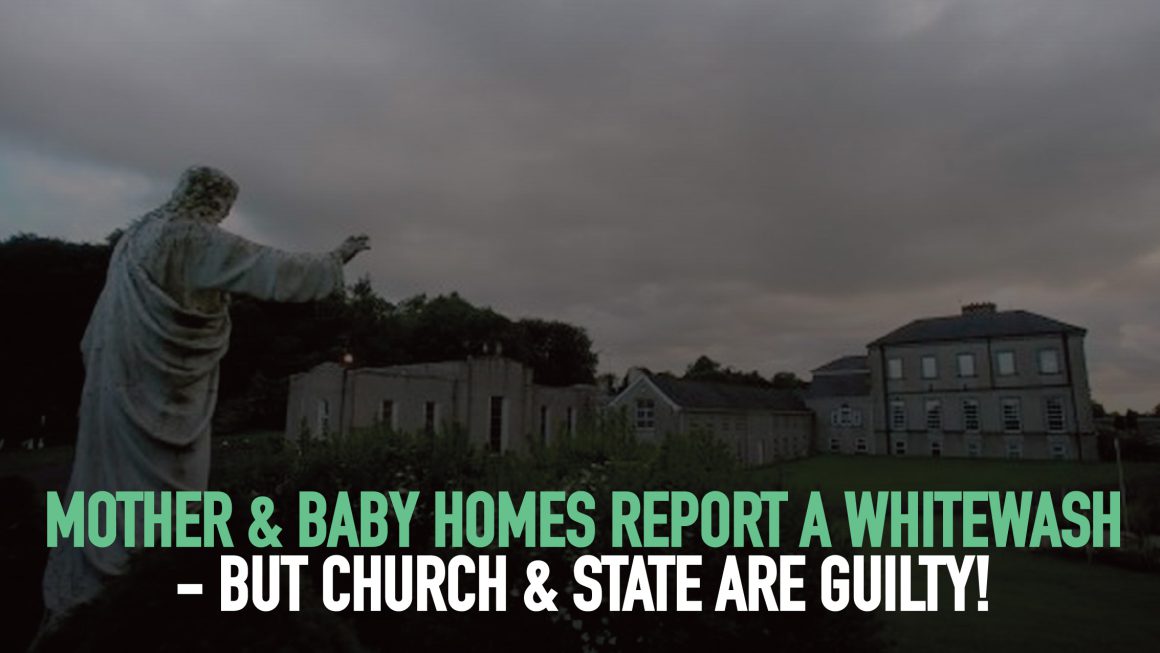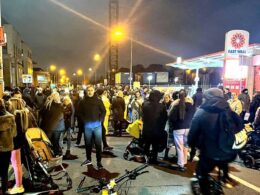By Ruth Coppinger
For years, survivors and adoptees of so-called ‘mother and baby homes’ have sought justice. Governments promised they’d get it. Sadly, all they’ve received from official Ireland this week is yet another slap in the face.
The church, the government and the long-awaited Commission Report into the homes have jointly tried to spread the blame for and minimise the horrific suffering of women and children sent to these homes, and the legacy left behind for their children and families.
In November, the government signaled it would have to seal the records of the homes for 30 years. After a public outcry, this had to be rowed back, but they’ve spectacularly failed again. Not alone had they the Report for months and failed to give it to survivors before release, they’ve attempted to turn reality on its head with a narrative that it was society that was to blame for the misogyny and cruelty, with the state and church only reflecting back, not being the source of it.
A whitewash
In the media prior to release of the Report, church leaders made out they were fulfilling a need arising from an intolerant society that shunned and shamed pregnant unmarried women. The Report obligingly continues this theme. Priests and nuns “did not invent” shame, but were “reinforcing wider social concerns”.
Early in the executive summary it says: “Responsibility for that harsh treatment rests mainly with the fathers of their children and their own immediate families. It was supported by, contributed to, and condoned by, the institutions of the State and the Churches. However, it must be acknowledged that the institutions under investigation provided a refuge — a harsh refuge in some cases — when the families provided no refuge at all.”
Of course it’s the case that families bundled daughters and sisters into these homes, many who’d been raped and had no idea whatsoever about sex. But it was the Catholic Church in the main that cultivated the shame and ignorance that moulded those attitudes. It did it through the pulpit; through controlling education; and through its massive influence over governments. The newly-independent state from 1921 leaned on the church for authority, and willingly outsourced to it everything to do with women, children, the poor and sick.
The Report is an exercise in deflection of the severity of the crimes that took place in the homes. It gaslights women, survivors and adoptees and often negates their testimonies.
Incredible conclusions
Some of the most enraging conclusions include:
· Adoptions could not be described as ‘forced’ because women signed papers and could “withdraw consent at any time”. This is despite multiple accounts by women throughout the Report itself saying that no option was ever offered, or that they were physically prevented from being with their babies. It also ignores the societal taboo of having a child outside marriage and lack of financial support.
· No evidence is found of money changing hands for babies. Yet numerous accounts exist of adoptive parents from the US giving ‘donations’ to religious orders. The failure to investigate child trafficking can only be to prevent orders having to pay financial compensation — or go on trial, as they should.
· Physical work girls / women did in the homes is said to be ‘no different’ to the average workload. Work included laundry, cleaning, scrubbing, and even cutting turf and timber, despite being heavily pregnant or having just given birth. This, and looking after other people’s babies — having had your own snatched away — somehow seems acceptable to the commissioners of the Report. They were also told by survivors of “useless work” given as punishment, but repeat an oft-used phrase that they found “no evidence to support the claim”.
· Pain and suffering is downplayed, e.g. “no evidence … women were denied pain relief or other medical interventions” during or after labour.
· Race played no role in babies being rejected — despite testimony over years from Black, mixed race and traveller survivors.
· The Report is totally contradictory about abuse. Emotional abuse took place, but they find no real evidence of physical or sexual abuse!
The Recommendations of the Report are often jaw-dropping: they see little basis for redress for all victims and think everything was fine after 1973 when ‘unmarried mother’s allowance’ was introduced (yet the homes continued for another 20-plus years).
On the vital issue of access to information, identity and birth certificates for adoptees, it says people can’t be denied access, but that there can be cases where adoptees would have to fight a legal case for access.
Harrowing testimonies
However, the Report is damning about infant mortality and some of the horrendous conditions in the homes. 9,000 children died in the 14 homes in its remit, an average 15% of all children born in them and twice the national average for the time. Deaths were worse in some than others. Gastrointestinal, respiratory and infectious disease were key causes, mainly resulting from poor diet, neglect, lack of infection control and hygiene, a congregated setting, no or unsterile equipment and often not employing any trained medical staff, despite being paid money from local authorities and the state.
Death rates varied across homes: but babies / infants were much more likely to die when their mothers were no longer resident in the home.
There are pages and pages of terrible conditions: inedible food; women eating meals “squatting on the floor” (Cork County Home 1921); women sleeping in “unheated lofts above the stables” (Castlepollard 1941); one toilet for 44 women in one Sacred Heart home; women being assaulted, raped and impregnated (in county homes that had a mix of ‘inmates’ including men).
The personal accounts in the Confidential Committee section, while badly recorded in many ways, are harrowing and give a window into the cruel nature of the ‘free state’ for women. A huge proportion of residents ended up there through rape and were victims of appalling ongoing family violence. Some ended up in the homes multiple times, though Galway County Council had an official policy of sending girls/ women to “the Laundries” as punishment if they were on a second pregnancy. A newspaper report was recently shared of a visit by politicians to the Tuam home in 1949 and a dinner after with the nuns.
While the outside world rarely questioned the working of the homes, those who did were swiftly cut across by the church hierarchy. Just look at its failure to make records available from many homes to this day.
Church and state — an insidious relationship
The state apology and Dáil debate were hollow and premature as those affected had no chance to study the 3,000 pages of the Report. As more and more do, it will become even more obvious that this whitewash can’t be allowed to be the official state verdict on the subject.
Fianna Fáil and Fine Gael are steeped in the abuse of the mother and baby homes and bending the knee to the church. In post-colonial countries with weak capitalist economies, two features often arise: they remain economically subservient to foreign powers and companies, but they also use religion to maintain control over the population, and rely on the organised church for authority. This was the case in Ireland.
The Catholic church played a crucial role in justifying a strict regime of censorship after 1922, and had a hands-on role in drawing up the reactionary 1937 constitution, which among other things banned divorce. In reality, it was a wing of the Irish capitalist state, epitomised by the notorious John Charles McQuaid, Archbishop of Dublin from 1940 to 1971, whose network of spies across the capital city monitored the actions of those that ‘stepped out of line’. It was McQuaid, alongside other members of the church hierarchy and the medical establishment, who led the charge against the Mother and Child scheme in 1950, that would have given free healthcare to all mothers and children under the age of 16. These forces had a visceral antipathy to state intervention into healthcare. All sections of the political establishment, with the exception of then Health Minister Noel Browne, cravenly capitulated to their pressure.
Fianna Fáil and Fine Gael have no desire to lift the lid on church abuse. They’re unwilling and incapable at this point of being willing to separate church and state, as we see by continuing church control of schools, health and maternity care. Minister for children, Roderic O’Gorman, and the Greens have been utterly ineffectual. Labour are talking tough now, but didn’t do it in governments before — they were in power when this Commission was set up with its narrow remit and chose the three lawyers / academics to author it.
The overwhelming majority of people don’t buy the line of the church or government on this issue. There’s more of a will than ever to separate church and state completely, but little political will or ability to do so.
We’ve seen in recent years that it’s movements such as those for marriage equality and repeal of the 8th that have made the biggest dents in the power of the church in Ireland. Establishment parties were forced to go further than they’d ever intended in relation to abortion rights by a persistent and popular campaign. We will need to maintain the pressure to force the changes needed:
Socialist Party calls for:
- Real acceptance of responsibility for the mother and baby homes by the church hierarchy, religious orders and the state.
- All church records to be handed over or seized by the state.
- Financial compensation for victims and survivors. Church land and assets to be taken into public ownership to pay for this and the redress for victims of all institutions.
- Criminal prosecutions of those responsible for crimes in institutions.
- Pharmaceutical companies such as GlaxoSmithKline to compensate for vaccine trials without consent on children.
- Emergency legislation now for rights to a birth certificate for all adoptees. And for access to all information about one’s identity, and any medical or vaccine trials on babies. The right to a birth certificate has existed in England and Wales since 1975, since 1987 in the north and 1930 in Scotland.
- Full involvement of survivors and adoptees about how to proceed with excavations, memorials and how this history is archived and presented.
- Separate church and state now! Religious orders not to control education and health — no more blocks on comprehensive sex education.
- Tax the super-rich and big business to invest in a secular, free and public health and education system that caters for all.
- Build a mass socialist feminist movement of workers, women and young people to end the rule of this backward, misogynistic and oppressive capitalist system.












